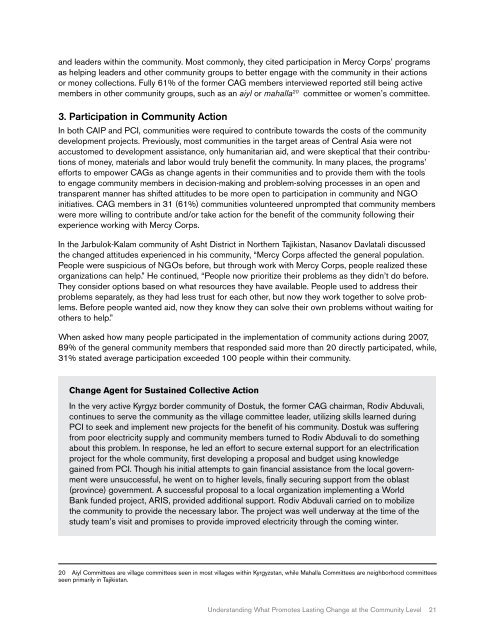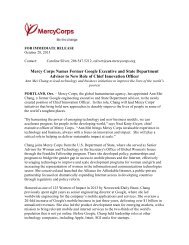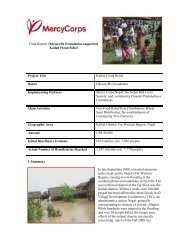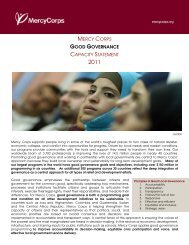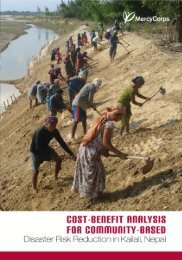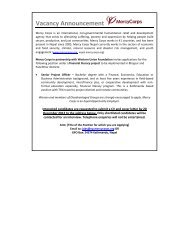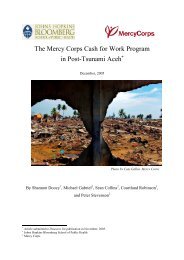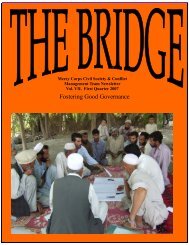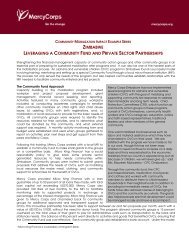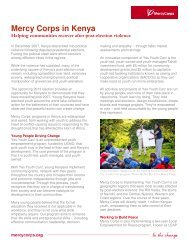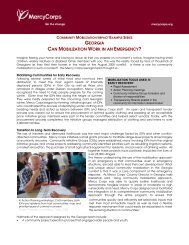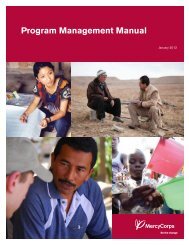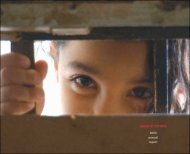SUSTAINABILITY FIELD STUDY - Mercy Corps
SUSTAINABILITY FIELD STUDY - Mercy Corps
SUSTAINABILITY FIELD STUDY - Mercy Corps
You also want an ePaper? Increase the reach of your titles
YUMPU automatically turns print PDFs into web optimized ePapers that Google loves.
and leaders within the community. Most commonly, they cited participation in <strong>Mercy</strong> <strong>Corps</strong>’ programsas helping leaders and other community groups to better engage with the community in their actionsor money collections. Fully 61% of the former CAG members interviewed reported still being activemembers in other community groups, such as an aiyl or mahalla 20 committee or women’s committee.3. Participation in Community ActionIn both CAIP and PCI, communities were required to contribute towards the costs of the communitydevelopment projects. Previously, most communities in the target areas of Central Asia were notaccustomed to development assistance, only humanitarian aid, and were skeptical that their contributionsof money, materials and labor would truly benefit the community. In many places, the programs’efforts to empower CAGs as change agents in their communities and to provide them with the toolsto engage community members in decision-making and problem-solving processes in an open andtransparent manner has shifted attitudes to be more open to participation in community and NGOinitiatives. CAG members in 31 (61%) communities volunteered unprompted that community memberswere more willing to contribute and/or take action for the benefit of the community following theirexperience working with <strong>Mercy</strong> <strong>Corps</strong>.In the Jarbulok-Kalam community of Asht District in Northern Tajikistan, Nasanov Davlatali discussedthe changed attitudes experienced in his community, “<strong>Mercy</strong> <strong>Corps</strong> affected the general population.People were suspicious of NGOs before, but through work with <strong>Mercy</strong> <strong>Corps</strong>, people realized theseorganizations can help.” He continued, “People now prioritize their problems as they didn’t do before.They consider options based on what resources they have available. People used to address theirproblems separately, as they had less trust for each other, but now they work together to solve problems.Before people wanted aid, now they know they can solve their own problems without waiting forothers to help.”When asked how many people participated in the implementation of community actions during 2007,89% of the general community members that responded said more than 20 directly participated, while,31% stated average participation exceeded 100 people within their community.Change Agent for Sustained Collective ActionIn the very active Kyrgyz border community of Dostuk, the former CAG chairman, Rodiv Abduvali,continues to serve the community as the village committee leader, utilizing skills learned duringPCI to seek and implement new projects for the benefit of his community. Dostuk was sufferingfrom poor electricity supply and community members turned to Rodiv Abduvali to do somethingabout this problem. In response, he led an effort to secure external support for an electrificationproject for the whole community, first developing a proposal and budget using knowledgegained from PCI. Though his initial attempts to gain financial assistance from the local governmentwere unsuccessful, he went on to higher levels, finally securing support from the oblast(province) government. A successful proposal to a local organization implementing a WorldBank funded project, ARIS, provided additional support. Rodiv Abduvali carried on to mobilizethe community to provide the necessary labor. The project was well underway at the time of thestudy team’s visit and promises to provide improved electricity through the coming winter.20 Aiyl Committees are village committees seen in most villages within Kyrgyzstan, while Mahalla Committees are neighborhood committeesseen primarily in Tajikistan.Understanding What Promotes Lasting Change at the Community Level21


